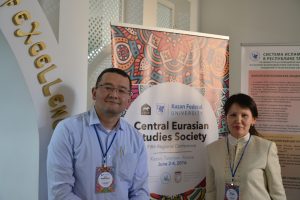GSPP faculty in Kazan for the Fifth Regional conference of the Central Eurasian Studies Society
08.06.2016
Dr. Saltanat Janenova together with Dr. Elena Maltseva from the University of Windsor (Canada) presented a joint paper on the Pension Reforms in Kazakhstan. The aim of this paper is to assess effectiveness of the recent pension re-reform in 2013 and to extract lessons from the Kazakhstani experience about the applicability of liberal fully privatized pension systems in the context of weakly developed political and economic institutions. The paper argues that both pension reforms (in 1998 and 2013) have failed to successfully address the problems facing the various population groups and build an effective and socially just old-age security system.
Saltanat also presented with her colleagues from NU Graduate School of Education, Dr. Aliya Kuzhabekova and Ainur Almukhambetova, a joint paper on Exploring Female Leaders’ Experiences in Civil Service of Kazakhstan. This paper explores the experiences of female senior managers in civil service of Kazakhstan, seeking to identify the unique contributions that women bring to civil service as leaders; the challenges that they face in performing leadership roles; the strategies that they use to succeed; and the factors responsible for variation in the experiences. Many of the challenges stem from societal expectations about the role of a woman in a family and gendered organizational practices, which favor males over females. A set of recommendations for increasing women participation in civil service leadership in Kazakhstan is offered based on the results of the study.
Dr. Aziz Bukhanov presented a paper with findings on the public discourse about Islam in contemporary Kazakhstani media outlets. The paper explores variations in the coverage of Islam which occur between newspapers printed in Kazakh and Russian languages as well as between newspapers with different forms of ownership. State-sponsored newspapers tend focus on the State involvement and policies in the religious affairs, such as activity of the Supreme Mufti, the DUMK (Spiritual Authority of Muslims of Kazakhstan), Directorate (later Committee) of Religious Affairs and so on. They also focus on the ‘right’ or politically correct version of Islam, while marginalizing and denying trends and schools that are considered as foreign, brought by missionaries and activists from other Islamic countries, primarily Middle East. Private newspapers show somewhat more diverse views, with a tendency to be skeptical towards State religious policies and their effectiveness.
Based in North America, CESS is an international organization for scholars concerned with the Central Eurasian region. The Central Eurasian Studies Society (CESS) seeks to promote high standards of research and teaching, to foster communication among scholars of Central Eurasia through meetings, publications, and networking, and to facilitate interaction among scholars at different stages in their career and in different places around the world. Conference Program is available at www.centraleurasia.org

